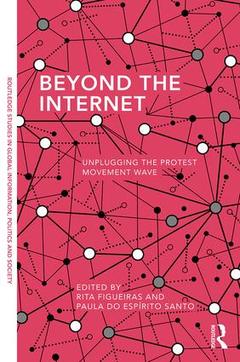Description
Beyond the Internet
Unplugging the Protest Movement Wave
Routledge Studies in Global Information, Politics and Society Series
Coordinators: Figueiras Rita, do Espírito Santo Paula
Language: English
Subject for Beyond the Internet:
Keywords
Activism; Political Participation; Internet; Politics and Technology; Protest Movements; Civic Cosmopolitanism; Agency; Political Communication; European Politics; Occupy Wall Street; IMF Intervention; Public Engagement; High Choice Media Environment; Implicit Negative Evaluation; Direct Democracy; Civil Society; ECB; Contemporary Societies; March 12th Movement; Puerta Del Sol; Celtic Tiger Boom; Spanish Indignados; Occupy LSX; Syntagma Square; National Assets Management Agency; Large Protest Events; Gleneagles G8 Summit; Tv Station; Nea Dimokratia; Greenham Women; Greenham Common Women’s Peace; Protest Wave; Protest Camps
Publication date: 12-2015
· 15.2x22.9 cm · Hardback
Publication date: 11-2017
· 15.2x22.9 cm · Paperback
Description
/li>Contents
/li>Readership
/li>Biography
/li>
The western economic and financial crisis began with the collapse of Lehman Brothers in 2008 and led the European Union countries into recession. After this, governments started to implement austerity measures, such as cuts in public spending, including public subsidies and jobs, and rising prices. In this context, Europe started to experience a wave of protest movements. Individuals started to use the manifold interactive digital media environment to both fight against the austerity measures and find alternative ways of claiming their democratic rights. Inspired by the 2011 Arab Spring and the Occupy Wall Street movement in New York (USA), the Occupy LSX encampment in Central London (UK), The Outraged (Los Indignados)/ 15M encampment in Central Madrid (Spain), the Syntagma Square?s Outraged movement in Athens (Greece) and the March 12th Movement in Lisbon (Portugal), although short-lived, epitomize an emerging alternative politics and participation via the media. This wave has promoted a debate on how the realm of politics is changing, as citizens broaden their ideas of what political issues and participation mean.
Beyond the Internet examines the technological dimension of the recent wave of protest movements in the United Kingdom, Spain, Portugal, Greece, and Ireland. Offering an opportunity to achieve a better understanding of the dynamics between society, politics and technology, this volume questions the essentialist attributes of the Internet that fuel the techno-centric discourse. The contributors illustrate how all these protest movements were active in the social media and garnered high levels of media attention and public visibility, in spite of their failure to achieve their political goals. As intra-elite dissent was pivotal in understanding the Arab uprisings, the coalition of national ruling elites with European institutions in terms of austerity strategy is essential in understanding the limits of media/technology power and, therefore, the dissociation between communication and representative power.
Introduction Rita Figueiras and Paula do Espírito Santo 1. Civic Cosmopolitanism and Political Communication: Media, Activism, and Agency Peter Dahlgren 2. Protest Camps as Media Stages: A Case Study of Activist Media Practices Across Three British Social Movements Anna Feigenbaum and Patrick McCurdy 3. Communication Strategies and New Political Movements in Spain Óscar G. Luengo and Javier G. Marín 4. From the Streets and the Occupied Squares to the Central Political Field: the narratives of the anti-austerity camp in Greece Nikos Sotirakopoupos and Olga Ntalaka 5. Social media and political participation: the Portuguese Indignados case João Carlos Correia 6. Unmasking the ‘Quiet Man’: Exploring Ireland’s Quiescent Response to Economic Crisis and Austerity Gemma Carney and Katy Hayward Unplugging the Protest Movement Wave Rita Figueiras and Paula Espírito Santo
Rita Figueiras is a professor at the Faculty of Human Sciences at the Universidade Catolica Portuguesa and member of the board of directors of the Research Centre for Communication and Culture (CECC). Her work focuses on media and political communication, particularly in the areas of public opinion, pundits, electoral campaigns, and, more broadly, the relationship between the media and democracy.
Paula do Espírito Santo is a professor at the School of Social and Political Sciences (ISCSP)—University of Lisbon (ULisboa) and School of Police Sciences and Internal Security (ISCPSI), Portugal, and is a visiting scholar at other universities. Her research focus is on political communication and political sociology, including the study of political culture, party supporters and social sciences methodology.




